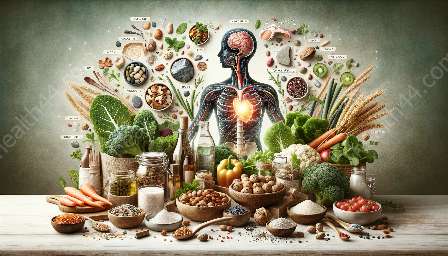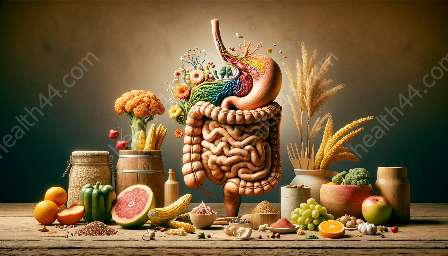The digestive system is a marvel of the human body, responsible for the breakdown and absorption of nutrients vital for sustaining life and promoting overall health. It comprises a network of organs that work together to convert the food we consume into energy and essential nutrients. A deeper understanding of the digestive system is integral to comprehending how it influences nutrition and health. This topic cluster aims to unravel the complex processes within the digestive system, while also exploring its intersection with nutrition and overall well-being.
The Digestive System: An Overview
The digestive system begins its work the moment we ingest food. It consists of a series of hollow organs, including the mouth, esophagus, stomach, small intestine, large intestine, and rectum, as well as accessory organs such as the liver, gallbladder, and pancreas. Each of these components plays a specific role in the process of digestion, ensuring that the food we eat is broken down into its individual components before being absorbed into the bloodstream.
The Role of Digestion in Nutrition
Digestion is critical for unlocking the nutritional benefits of the foods we eat. Carbohydrates, proteins, and fats must all be broken down into simpler forms before they can be absorbed and utilized by the body. Without proper digestion, our bodies would struggle to access the essential nutrients necessary for growth, repair, and energy production. Thus, the digestive system is a key player in maintaining optimal nutrition and preventing malnutrition.
Relationship between Digestive Health and Overall Well-being
Furthermore, the health of the digestive system profoundly impacts our overall well-being. A healthy gut is not only vital for efficient digestion and absorption of nutrients but also plays a crucial role in supporting a robust immune system. Emerging research has even highlighted the intricate connections between the gut and mental health, demonstrating how the state of the digestive system can influence mood and cognitive function.
Factors Affecting Digestive Health
Several factors can impact the health and function of the digestive system. Dietary choices, stress levels, physical activity, and hydration all play integral roles in maintaining optimal digestive health. Additionally, the presence of certain conditions, such as irritable bowel syndrome (IBS) or inflammatory bowel disease (IBD), can significantly affect the digestive system, leading to discomfort and potential complications if left unmanaged.
Supporting Digestive Health through Nutrition and Lifestyle
Proper nutrition and lifestyle habits are fundamental in supporting the health and function of the digestive system. Consuming a diet rich in fiber, probiotics, and prebiotics can promote intestinal health and regularity. Furthermore, staying adequately hydrated and managing stress levels are essential for reducing the risk of digestive disturbances. Regular physical activity also aids in maintaining a healthy digestive system, as it can help regulate bowel function and promote overall well-being.
Conclusion
The digestive system is a remarkable and intricate network that exerts a significant influence on both nutrition and overall health. By understanding its complexities and recognizing its interplay with nutrition, we can make informed choices to support the well-being of our digestive system, thus fostering better health and vitality.




























